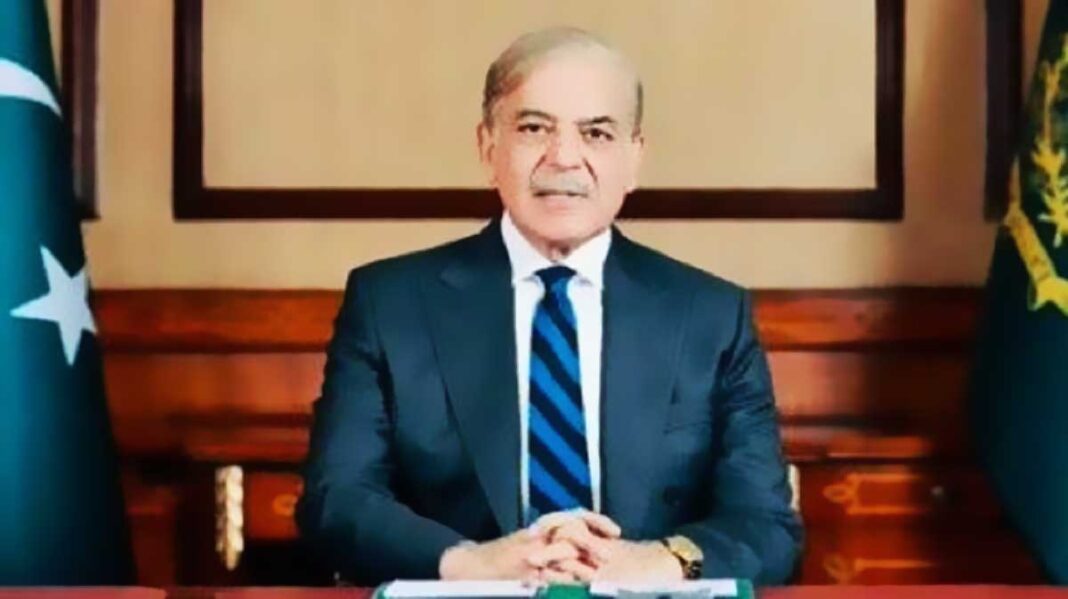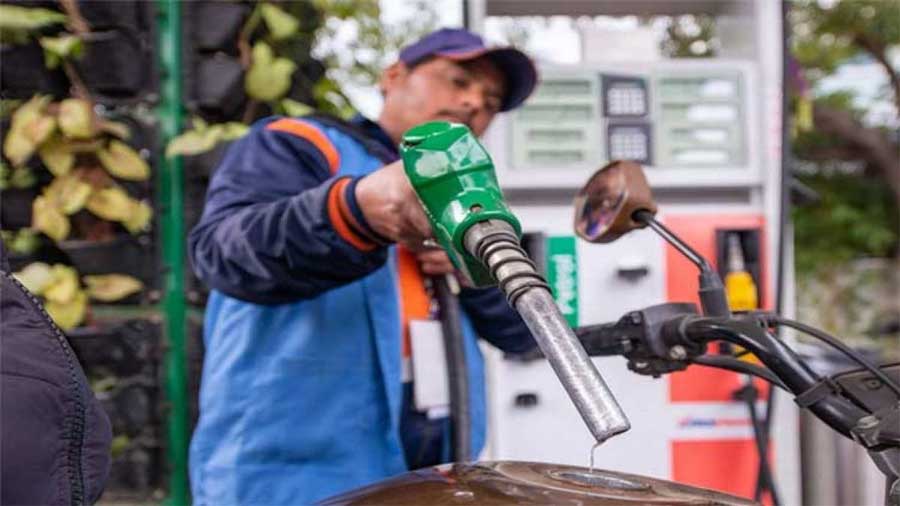US-China diversity: Shehbaz
NEW YORK: As US-China relations grow increasingly tense over Taiwan, Prime Minister Shehbaz Sharif says Pakistan will be “happy” to play a positive role to bridge their differences in the interest of peace and stability in the world, if the two parties so desire.
“If China and the US so desire, Pakistan would be happy to play a positive role to bridge their differences, as we had done in the past,” he said in response to a question during a wide-ranging interview with Newsweek, while referring to Islamabad’s pivotal role in bringing the two countries together half a century ago for talks that served as the foundation for their modern relationship.
Newsweek Senior’s Foreign Policy Writer Tom O’Connor, who conducted the interview via e-mail, pointed out that the Pakistani leader spoke about the need for greater international cooperation, the role Pakistan could play in preventing the world from sliding into an ever deeper set of crises, and other key issues.
PM Sharif not only expressed his views on the stark deterioration of relations between the United States and China, but also on his stance about Russia’s ongoing war in Ukraine.
Closer to home, Sharif discussed the turmoil plaguing neighbouring Afghanistan, the unresolved Kashmir dispute, and an uptick in militant attacks within Pakistan’s own borders that threatens its own national security at a time of domestic political challenges.
Sharif took office in April in the wake of a no-confidence vote that ousted prime minister Imran Khan, correspondent O’Connor noted, marking a return to power for the Pakistan Muslim League-N.
“The present government is truly national in nature,” Sharif said, referring to the coming together of the country’s all political force on an agreed-upon national agenda of economic reform and stabilization.
In the interview, he said Pakistan has traditionally maintained good relations with China and the United States, pointing out that historically, it was Pakistan that acted as a bridge in opening up the relationship between the two countries.
Pakistan continues to highlight the need for avoidance of a confrontational approach, he said, adding that bloc politics and any drift towards cold war will not produce any positive results, and in fact would be counterproductive for growth and stability.
“Pakistan strongly believes that inter-state relations should be based on mutual respect and peaceful resolution of disputes by upholding the principles of the UN charter and international law.”
The prime minister said that polarization would have serious consequences for the global economy afflicted by the impacts of the COVID-19 pandemic and the Ukraine crisis. The developing countries, like Pakistan, are already suffering from external shocks to their socioeconomic well-being, and do not desire aggravation of these challenges induced by major power rivalry.
Replying to a question, he said Pakistan desires to build a broad-based and sustainable partnership with the United States on the basis of mutual respect and mutual benefit.
“We encourage major US companies to invest in Pakistan’s lucrative market and enhance commercial ties, particularly in its growing IT sector,” PM Sharif said.” There is a strong Pakistani Diaspora in the US that is acting as a bridge to deepen the ties between our two countries and the people.
On the Ukraine conflict, he called for a diplomatic solution in accordance with relevant multilateral agreements, international law, and the provisions of the UN Charter.
On tensions with India, the prime minister said Pakistan desires good relations with all neighbours, but New Delhi’s India’s illegal and unilateral actions of August 5, 2019 in IIOJK [Indian Illegally Occupied Jammu and Kashmir] were a huge setback to Islamabad’s efforts to build regional peace.
Pakistan, he said, has always been ready to promote peace in the region on the basis of mutual respect and sovereign equality, emphasizing that the core issue between India and Pakistan is the Jammu and Kashmir dispute, the resolution of which will open new vistas of cooperation. Shehbaz
On the deteriorating economic and humanitarian situation in Afghanistan, the prime minister said, “Our message to the international community would be to remain engaged, continue to assist the Interim Government in key social and economic areas, and unfreeze Afghanistan’s financial assets to help build a sustainable economy.
“We will continue to impress upon the Interim Afghan Government the importance of taking demonstrable actions on its commitments including those relating to inclusivity, respect for human rights of all Afghans, including girls’ education, and effective counter-terrorism action.”
Responding to a question, PM Sharif said Pakistan is determined to root out terrorism. At the same time, he said, “It is also no secret that Pakistan has been one of the biggest victims of state-sponsored terrorism that is planned, supported and financed by hostile intelligence agencies.
“The main objective of these terrorist acts is to destabilize Pakistan and undermine our economic development”.
Here is the transcript of the interview:
Newsweek: Transitions of power are always difficult, as the United States itself experienced just last year. Former prime minister Imran Khan’s departure was acrimonious and divisive for Pakistan. What is your plan to bring your nation together, to unite behind your leadership and look toward the future?
PM: What we need to understand first of all is the fact that the change of the government took place through a constitutional process. All political forces of the country minus Imran Khan’s PTI [Pakistan Tehreek-e-Insaf] came together to form this vastly representative government to take on the most urgent issues facing the people.
In terms of the vote cast in the previous General Elections of 2018, the political parties that are part of the coalition government represent 70 percent of the electorate. The present government is truly national in nature.
The coalition government is working on an agreed-upon national agenda of economic reform and stabilization. It is the topmost priority at the moment. We are also focusing on making governance efficient and service-oriented, besides improving Pakistan’s relations with friendly countries on the basis of our mutual interests.
The national agenda I mentioned has broad-based support because people understand the criticality of the issues that need to be dealt with.
Meanwhile, Prime Minister Muhammad Shehbaz Sharif on Tuesday said that climate change, water security and food security were three interconnected challenges and to cope with these issues, they would have to take immediate steps to save the future generations from their impacts.
He said that the government was fully cognizant of these problems and resolution of these issues was among the government’s top priorities.
The prime minister chaired a meeting of the federal cabinet at the Prime Minister’s House. The cabinet was given a detailed briefing on the impacts of climate changes in the country.
Pakistan had been included among the top eight worst climate affected countries of the world during the last ten years which was a matter of a grave concern whereas it had added only just 1 percent of emissions when compared with the rest of the world emissions, aggravating the global warming impacts, it was told.
The climate changes had also badly affected the natural resources of Pakistan and the increase in population was one of the main reasons, it was added.
It was underlined that there was dire need for immediate implementation of ‘Mitigation and Adaptation” mechanism in this regard.
It was suggested that a documentary highlighting awareness over issues confronted by Pakistan, and the steps taken to reverse climate change effects, and COP-27, might be presented at the global fora.
It was also emphasized upon the need for adoption of international level and the contemporary latest scientific measures. The cabinet agreed that duration of the public service messaging on Tv channels should be effectively ensured to overcome these issues.
Moreover, the issues of climate change and global warming should be included in the syllabus of schools and colleges besides, ensuring strict implementation of climate change policies.
The cabinet also stressed upon planning of rain harvesting on war footing and a suggestion was considered over commencement of a pilot project in Islamabad under the same project.
It also unanimously approved constitution of a cabinet committee headed by Minister for Climate Change Sherry Rehman and comprising ministers of relevant ministries who would present their recommendations over the short, medium and long terms projects.
The cabinet, in its meeting, granted its approval to ministry of finance’s recommendation regarding fixation of minimum limit of Diyat amount for the year 2022-23, equal to 30,630 gram silver, which amounted to more than Rs430,000 approximately.
The cabinet also unanimously rejected a summary of ministry of national health services, regulations and coordination regarding increase in MRP of 35 drugs and directed that no change of any kind in the prices of medicines should be made without the approval of the federal cabinet.
The cabinet also ratified ECC’s decisions taken in a meeting on 11-08-2022 regarding issuance of GOP guarantee in favour of National Bank of Pakistan (NBP) for financing facility of US $ 142.0 million (Aviation).
It also approved the following decisions taken in the meeting of CCLC on 15-08-2022:-
1. Authorization of Government Married Accommodation to Defence Security Force (DSF) Personnel: Amendment in Army Regulations (Rules)-1998
2. Amendment in Annex’A’to Rule 11 of Scales of Rations and Supplies (Regulations), 2015.
3. Amendments in National Skills University Act, 2018
4. Appointment of Law Officers in Office of the Advocate General, ICT, Islamabad by Amending the President’s Order 1 of 2015
5. Pakistan Veterinary Medical Council (PVMC) Employees Service Regulations, 2022.
The cabinet also approved inclusion of 10 persons on the Exit Control List (ECL), removal of 22 persons from ECL and grant of OTP (one-time permission) to 3 persons, on the recommendations of the ministry of interior.
The prime minister and the federal cabinet, on the occasion, felicitated Minister for Industries and Trade Makhdoom Murtaza Mahmud, secretary cabinet division Ahmad Nawaz Sukhera, secretary ministry of industries and trade Chaudhry Imdadullah Bosal for the conferment of civil awards and appreciated their services.
Meanwhile, Prime Minister Shehbaz Sharif on Tuesday strongly condemned the attack on a polio team in Tank, saying the enemies of the health of the nation’s young generation would be strongly dealt with.
The prime minister condemned the killing of two policemen Sepoy Pir Rehman and Sepoy Nisar Khan as a result of the firing of terrorists on the polio team in Tank’s slum area of Kot Azam.
He expressed sympathies with the policemen who lost lives in the line of duty and said the nation paid tribute to the great sacrifices rendered by police.
PM Sharif said those involved in the attacks on the polio team wanted to make the children of the country suffer from disabilities due to the crippling disease.
He vowed to eliminate the persons pursuing such agenda and nefarious designs against the young generation.
Meanwhile, UAE-based biotechnology company, Hayat Biotech on Tuesday expressed its interest to cooperate and invest in the digitization of Pakistan’s health sector and the establishment of plasma fractionation facility.
The interest was shown by a delegation of Hayat Biotech and Sinopharm, which led by Saboor Karamat, General Counsel of the UAE’s Sheikh Ahmed Dalmook Al-Maktoum, called on Prime Minister Shehbaz Sharif here.
Minister for National Health Services Abdul Qadir Patel and relevant senior officials were also present in the meeting.
The Prime Minister said that as the two countries enjoy decades-old brotherly relations, the UAE had always helped Pakistan in hard times.
He lauded the deep interest of Sheikh Ahmed Dalmook Al-Maktoum for cooperation and investment in Pakistan’s health sector.
During the meeting, it was told that due to lack of plasma fractionation facilities in Pakistan, the annual 3 million liters of blood collection in the country was not fully utilized. After the establishment of plasma fractionation facility in Pakistan, thousands of lives will be saved through the utilization of all contents to be separated from the donated blood.
The Prime Minister directed all the relevant institutions to fully facilitate the companies for the proposed project. – APP








Comments are closed.